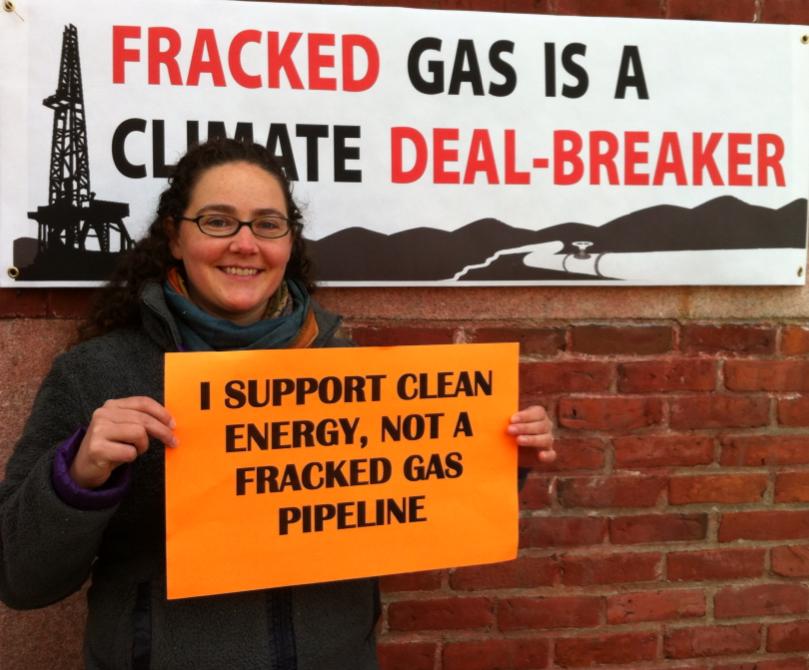VPIRG and hundreds of our supporters joined with a coalition to urge Governor Peter Shumlin and the Public Service Board to stop construction of the fracked gas pipeline. Read the updated statement to the media and the full letter to Governor Shumlin and the Public Service Board below.
————————————————
Updated statement
Middlebury, Vermont — Just days before the Public Service Board is expected to make a major ruling on the Addison Natural Gas Project, more than 1,200 people added their names to a letter originally signed last month by business owners, nonprofit organizations, faith leaders, farmers, academics, and community representatives across Vermont asking Governor Peter Shumlin to pull his support for additional construction of the pipeline and stop at the 11-mile mark.
“For the health and economy of our state we wish to say, ‘Enough’,” reads the letter. Bill McKibben, the founder of 350.org, added, “The gas pipeline was planned in a different age, before we knew as much as we do now about the effects of fracking and methane on the atmosphere. It’s important to re-evaluate this project based on updated facts.”
More than 200 of the 1,400 signers are Vermont businesses, organizations, and community leaders wanting to “close this painful chapter in our state’s history and turn our positive energies toward a prosperous and sustainable future.” The signers include household names such as Ben & Jerry’s, American Flatbread, High Mowing Organic Seeds, AllEarth Renewables, Aqua Vitea, and Maple Wind Farm, as well as beloved local establishments such as Vermont Cookie Love, Northshire Bookstore, and Magnolia Bistro in Burlington. Bill McKibben as well as several Vermont politicians signed, including candidate for Lieutenant Governor David Zuckerman. Vermont Interfaith Power and Light, town energy committees, and dozens of Vermont farms joined the call to stop construction.
“Please add my voice to those being raised in opposition to the gas pipeline,” commented David Rosen of Adirondack Guideboat in North Ferrisburg. “My company designs, builds and sells high-end rowing boats and we exhibit and sell them at shows all across the country. As a representative of the State of Vermont I often receive the admiration of others for our advanced environmental policies and values. I don’t find the Addison Natural Gas Project to be representative of those values or smart environmental policies.”
“Pipeline construction is at a common sense stopping point,” said Bobbie Carnwath, a member of the Cornwall Planning Commission. The portion of the project that has already been constructed will be used for “looping” for existing customers, “but any added pipeline beyond that point would just drive up costs for current customers to bring in more fracked gas, when better alternatives are available today.” The project cost has increased to $154M since initial projections in 2011 of $60-$70M. International Paper pulled its support for Phase II of the pipeline early in 2015 following a less substantial cost increase. As a result, Vermont Gas already cancelled that leg of the project.
“Moving away from dirty fossil fuels and investing in local clean power is good for the economy, good for our earth, and good for Vermonters,” said Jon Erickson, Professor at UVM and Fellow of the Gund Institute for Ecological Economics. Investing in fossil fuel infrastructure prevents investments in green technologies, Dr. Erickson continued. “Energy from wind, solar, biomass, hydro, and geothermal systems promote in-state jobs and energy independence. They just make sense.”
New technologies like cold climate heat pumps, which have fewer greenhouse gas emissions than gas, have become readily available and more cost effective in the four years since Phase I of the pipeline was conceived. “The fracked gas pipeline proposal is outdated and out-of-touch with current economic and environmental realities,” said Ben Walsh of the Vermont Public Interest Research Group (VPIRG). “Spending tens of millions of dollars of ratepayers’ money to import fracked gas didn’t make sense when this pipeline was proposed, and it makes even less sense today.”
“Ultimately this is an issue of justice,” said Rev. Daniel Cooperrider, pastor of the Weybridge Congregational Church. “We have a shared moral responsibility to be vigilant in our stewardship of the earth. The call of our times now is to respond to the threat of climate change in a way that shows compassion for all life, now and for generations yet to come.”
Regardless of their political, religious, or other views, the signatories spoke in one voice calling on the Governor to adjust his energy policy so that it complies with the most up-to-date economic and scientific research and stops the pipeline at 11 miles.
The full text of the letter to the governor and the Public Service Board with a list of the signers is below.

